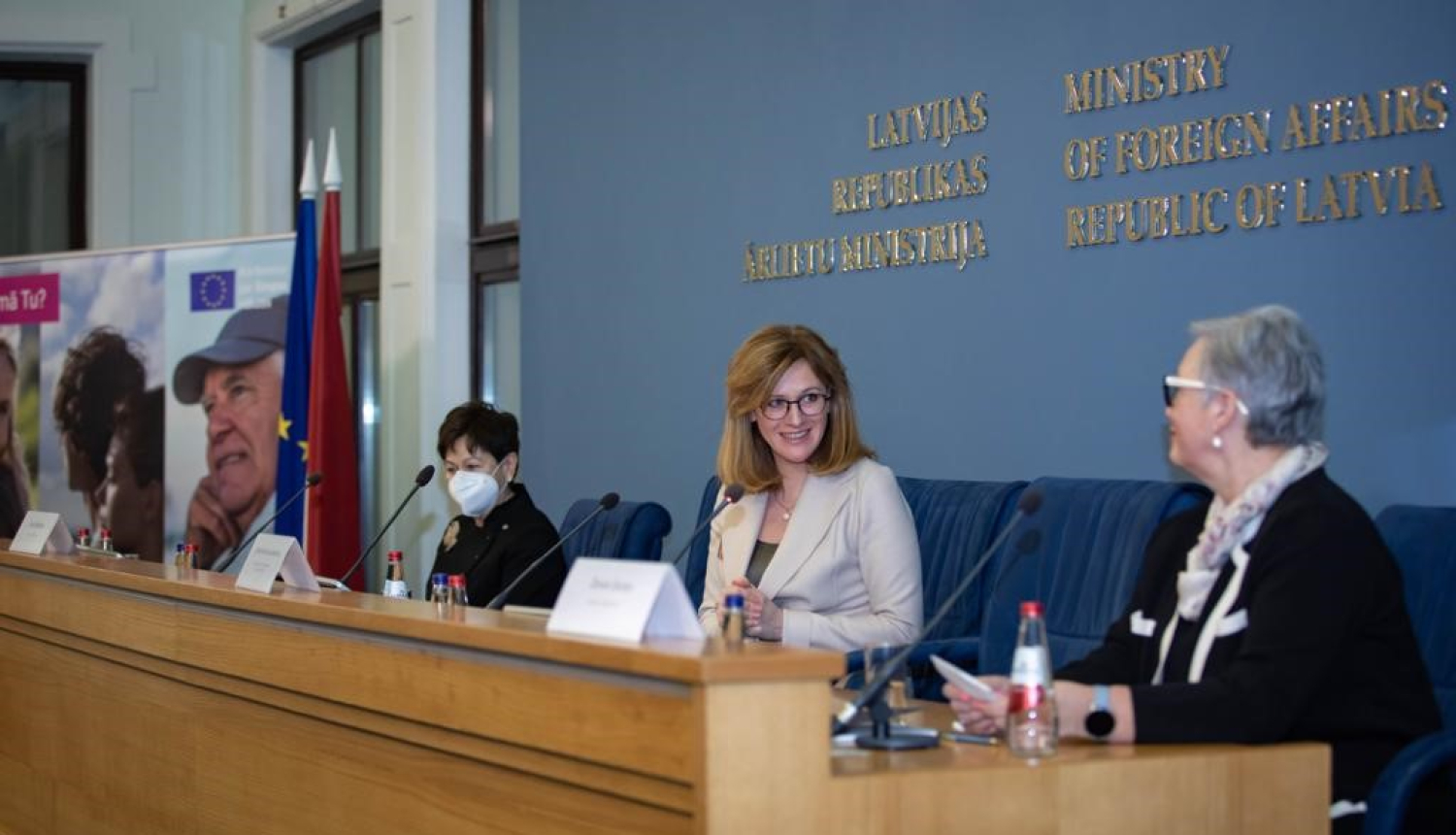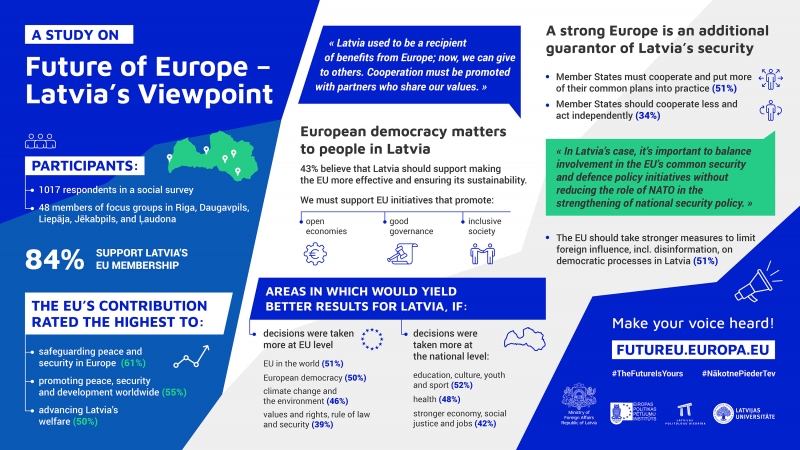On 8 December 2021, the Ministry of Foreign Affairs hosted an event for the presentation of a study, “Future of Europe – Latvia’s Viewpoint”, created as part of the Conference on the Future of Europe provides a valuable insight into the standpoint of the residents of Latvia on future priorities for the European Union (EU). The study reveals the opinion of Latvia’s society on ten topics that constitute the thematic core of the Conference on the Future of Europe. It was produced by Prof. Žaneta Ozoliņa from the University of Latvia and Prof. Inna Šteinbuka on the basis of the results of opinion polls and discussions among people in Latvia.
In her remarks to the participants, the Parliamentary Secretary of the Ministry of Foreign Affairs, Zanda Kalniņa-Lukaševica, underlined that the result demonstrated once again the strong support among the Latvian nationals for EU membership and recognition of the EU’s contribution to promoting of welfare. If a referendum on Latvia’s membership of the EU were to be held next week, 84% of people in Latvia would choose EU membership and only 12% would opt for withdrawal.
The Conference on the Future of Europe encourages participants to define areas that require an active EU-level policy and action. People in Latvia have conclusively expressed their wish for a strong, values-based EU, which also underpins security concerning personal well-being, freedoms, and the freedom of choice, the Parliamentary Secretary said.
The study indicates that people in Latvia regard the fate of European democracy as being important. People’s opinions highlight the need to move ahead with the EU initiatives that promote an open economy, good governance and an inclusive society. In turn, they also call for using Latvia’s expertise of combating hybrid threat, for instance, in the field of disinformation and cyber-security, at the European level.
In the panel discussion on “Europe’s values: today and tomorrow”, Zanda Kalniņa-Lukaševica underlined in particular that a pivotal point can be observed in people’s attitude towards the EU: the outcomes of research suggest that European values, the rule of law, democracy and security are a priority area for people in discussions on Europe’s future. In previous years, people’s debate was explicitly dominated by interest in the EU’s contribution to Latvian economy and the opportunities to attract investments for further growth and increase in the overall living standards, while leaving the values dimension as something of lesser importance.
Nevertheless, the experts reminded that EU values and the sense of security they offer is not self-evident. The study underlines that the highest scores have been given to EU contribution to safeguarding peace and security in Europe, with 62% of respondents pointing to the EU’s positive input. The report also reveals that, regardless of social tensions under the COVID-19 crisis, the society has a positive perspective of the EU’s influence on promoting welfare. The questionnaires show that 53% of respondents believe in the EU’s positive impact on welfare in Latvia, which is a slight increase from 50.5% in 2017.
The presentation of the study was followed by two panel discussions with experts in the field and Latvia’s representatives in the Plenary of the Conference on the Future of Europe: Zanda Kalniņa-Lukaševica, Parliamentary Secretary at the Ministry of Foreign Affairs; Vita Anda Tērauda, Member of the Saeima; Dace Melbārde, Member of the European Parliament; Kristīne Zonberga, Director of the Civic Alliance of Latvia; Ralfs Eilands, European of the Year 2019 in Latvia; Juris Binde, Board Chairman of LMT; Līga Meņģelsone, Director General of the Employers’ Confederation of Latvia; Andris Strazds, Adviser at the Bank of Latvia; and Anda Ķīvīte-Urtāne, Director of the Institute of Public Health at Riga Stradiņš University.
Further information:
The study titled “Future of Europe – Latvia’s Viewpoint” has been produced with support from the Ministry of Foreign Affairs, the University of Latvia, the European Policy Research Institute (EPRI) at the Latvian Academy of Sciences, and the Latvian Association of Political Scientists. Research was directed by Prof. Žaneta Ozoliņa from the University of Latvia and Prof. Inna Šteinbuka. The results of the study are available in Latvian.
The Conference on the Future of Europe aims at increasing the role of people in shaping the EU’s future policy to increase its resilience. At present, any resident of the European Union can visit the multilingual digital platform of the Conference to learn about events taking place across Europe, get involved and share ideas.





